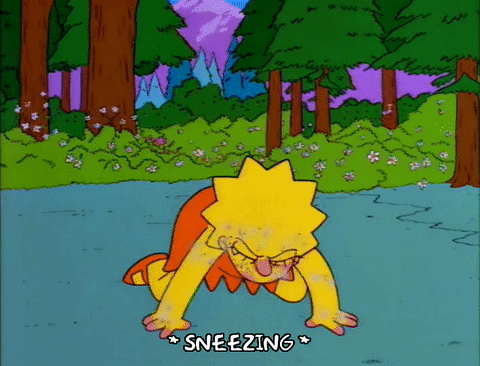Spring is here but not everyone will be out and about stopping to smell the roses.
At the first sign of warmer weather, Lannah Sawers-Diggins, 61, would be struck with flu-like symptoms, right on cue, every year.
What she didn’t realise was her springtime sickness was actually late-onset seasonal allergies.
“I used to think I was getting a really bad cold because I’d start sneezing, my eyes would water, and I’d develop itchy rashes, but it was all to do with allergies – even though I’d never had them before,” she says.
Community pharmacist Gai Williams says more adults are developing allergies later in life. “In springtime you’ve got flowers blooming and pollen coming out, and that’s when you can get SAR,” she says.
While it’s not exactly clear why some people develop these sensitivities later in life, Gai says it may be linked to age-related changes in immunity and can be managed.
“Whether you take medication or make lifestyle changes, it’s possible to get through the season relatively unscathed if you take the right precautions,” she says.

A step ahead
While rural settings may seem like an obvious trigger, Lannah says inner-city locations were worse for her.
Checking pollen counts can give you a sense of how severe your allergies will be that day. “Your local weather report on the news may provide details of pollen counts in your area,” Gai explains. Alternatively, try a smartphone app that uses your current location via GPS to plan your day around your allergies.
Pollen counts are typically higher on hot, windy sunny days compared with still, cooler conditions. If it’s a high-pollen day and you use medication, take them before going outside.
“Whether it’s preventative tablets, an asthma puffer or nasal spray, it’s worth pre-empting an allergic reaction rather than risking it and taking relief medication once you’ve already developed symptoms,” Gai explains.
Wash and wear
While you don’t have to wear a HazMat suit to venture outside, the right clothing and accessories can lessen symptoms – especially when gardening or walking the dog.
“Many people are allergic to physical contact with certain plants,” Gai says. “If you must spend time outdoors on a high-pollen count day, wear a long-sleeved top and pants.
Gloves, goggles and some face masks can help if your symptoms are severe.”
Then change on your return.
“Take your shoes off at the door, shower and wash your hair when you come inside to remove allergens,” naturopath Karina Francois says.

Hit refresh at home
House or apartment, every home has dust mites and mould spores. While you’ll never be entirely free of them, experts suggest changing the air-conditioner filter, using a dehumidifier and vacuuming can reduce mould growth and dust.
“Use a vacuum cleaner that has an air purifier to clean upholstery, pillows and carpets where allergens congregate,” Karina says.
Once your home is clean, keep it that way. “On high-pollen days, shut windows and rinse the dog off before she comes back inside,” Karina suggests.
Seek professional advice
Seasonal allergies may require medication so talk to your pharmacist or GP. Over-the-counter and prescription tablets, sprays, inhalers and eye drops are available depending on severity. If symptoms persist, your GP may refer you to a specialist for long-term injection therapy.
Never start taking hayfever medication without guidance – some of the ingredients are known to cause interactions with prescription medication. “Potential side effects may include confusion, drowsiness, dizziness, and dry mouth and eyes,” Gai explains. Changes in mood, behaviour, and sleep quality are also possible.
“Decongestant meds, such as pseudoephedrine, may also cause problems for people with high blood pressure or heart conditions and shouldn’t be used to treat allergies,” she says.
Under guidance from her doctors, Lannah chose not to take allergy medication – apart from preventative medication for mild asthma – relying instead on nasal sprays to keep her sinuses clear.
“As long as I carry them with me, and use them often, I have a reasonable amount of control over my symptoms,” she says.

Try natural remedies
Flavonoids are natural antihistamines found in nearly all types of fruits, vegetables, herbs and spices. “The best sources are citrus fruit, berries and legumes,” Karina says.
“Foods rich in vitamin A such as carrots, pumpkin and leafy greens are equally as important for healthy immune function. Similarly, turmeric is well known for powerful antihistamine effects,” she adds.
Rinsing your nasal passages and sinuses with a salt-water spray or neti pot can also help. And may people claim relief from an old-fashioned menthol inhaler stick.


